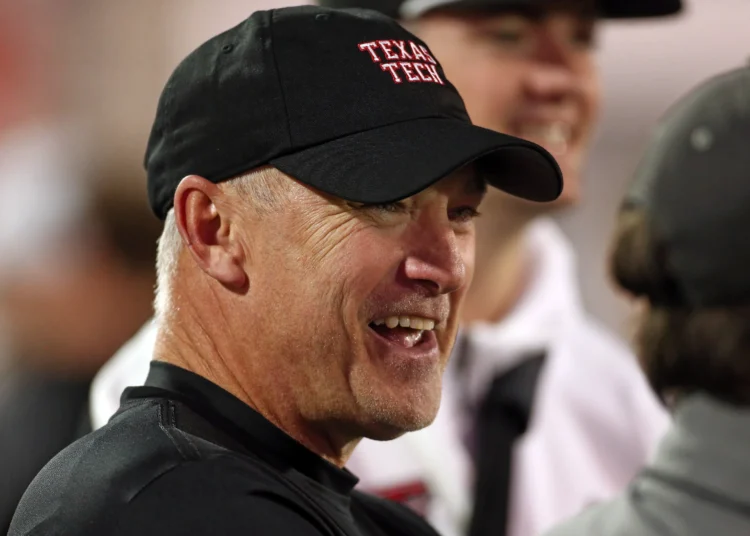The world of college football is in the midst of a seismic shift, and Texas Tech head coach Joey McGuire isn’t afraid to speak his mind about it. From conference realignments to the explosion of NIL (Name, Image, and Likeness) deals and the transfer portal, the sport is evolving faster than ever. For McGuire, who took over the Red Raiders in 2021, adapting to these rapid changes is both a challenge and an opportunity.
The Impact of NIL and the Transfer Portal
When McGuire reflects on how college football has transformed in just a few years, one word comes to mind: “crazy.” The introduction of NIL deals has fundamentally altered recruiting and roster management. Players can now profit from endorsements, sponsorships, and personal brands, making financial incentives a major factor in their college decisions.
“It used to be about facilities, about development, about getting a shot at the NFL,” McGuire said in a recent interview. “Now, that’s still part of it, but NIL is a huge piece of the puzzle. You can’t ignore it.”
Texas Tech, like many other programs, has had to adapt quickly. The university’s NIL collective, The Matador Club, has helped position the Red Raiders competitively, but McGuire acknowledges that not every school is playing by the same rules.
“There’s no real uniformity,” he said. “Some schools are offering insane amounts of money to players, and there’s not much oversight. It’s the Wild West right now.”
The other game-changer is the transfer portal, which has become a free-agency market of sorts. Players are no longer locked into programs, with many opting to transfer multiple times in pursuit of better opportunities. While this benefits student-athletes, it creates challenges for coaches trying to build cohesive teams.
“You could spend a whole offseason building chemistry, only to lose key guys in the spring,” McGuire noted. “It forces you to recruit your roster every day, not just high school kids.”
Conference Realignment and Its Ripple Effects
Another major shift in college football is conference realignment. The Big 12, where Texas Tech resides, has seen significant changes with the departure of Texas and Oklahoma to the SEC and the addition of new schools like BYU, Houston, Cincinnati, and UCF. While this brings excitement, it also creates uncertainty.
“The Big 12 is going to look a lot different, and we have to be ready,” McGuire said. “We’re bringing in great programs, but the loss of Texas and OU changes the dynamic. We have to establish ourselves as a top-tier team in the new Big 12.”
For Texas Tech, this means continuing to invest in infrastructure, recruiting, and NIL to remain competitive. The Red Raiders have historically been a strong program but will need to elevate their game as the landscape shifts.
Coaching in a New Era
For coaches like McGuire, managing a team is no longer just about Xs and Os. The job now includes keeping up with NIL trends, navigating the transfer portal, and maintaining relationships with players to prevent unexpected departures.
“I love coaching. I love developing players,” McGuire said. “But now, part of the job feels like being a general manager. You have to think about contracts, about keeping your roster intact, about making sure your guys are taken care of on and off the field.”
While some veteran coaches have expressed frustration with these changes—Nick Saban and Dabo Swinney, for example, have openly criticized NIL and the transfer portal—McGuire sees it as an evolution of the sport.
“You can either complain about it or adapt,” he said. “The best programs are the ones that adjust, that figure out how to make it work. We’re embracing it and finding ways to use it to our advantage.”
The Future of College Football
As McGuire looks ahead, he believes more changes are inevitable. There is increasing talk of federal regulation of NIL to create a more level playing field, and some believe the NCAA will eventually introduce a salary-cap-style system for NIL to prevent the wealthiest programs from hoarding all the top talent.
“I think some form of structure has to come,” McGuire said. “Right now, there’s no consistency. Some kids are getting life-changing money, while others aren’t getting anything. It’s not sustainable in the long run.”
Despite the challenges, McGuire remains optimistic about Texas Tech’s future. He sees the shifting landscape as an opportunity to establish the Red Raiders as a powerhouse in the new-look Big 12.
“We’re in a great position,” he said. “We have passionate fans, great facilities, and a staff that’s all-in. If we keep adapting and pushing forward, we can be one of the top programs in the country.”
College football is changing faster than ever, and Joey McGuire is right in the middle of it. While he acknowledges the chaos, he also sees opportunity. With NIL, the transfer portal, and conference realignment reshaping the sport, Texas Tech is determined to stay ahead of the curve.
“It’s crazy,” McGuire said. “But it’s also exciting. The teams that figure it out first are the ones that will win big in the future.”














